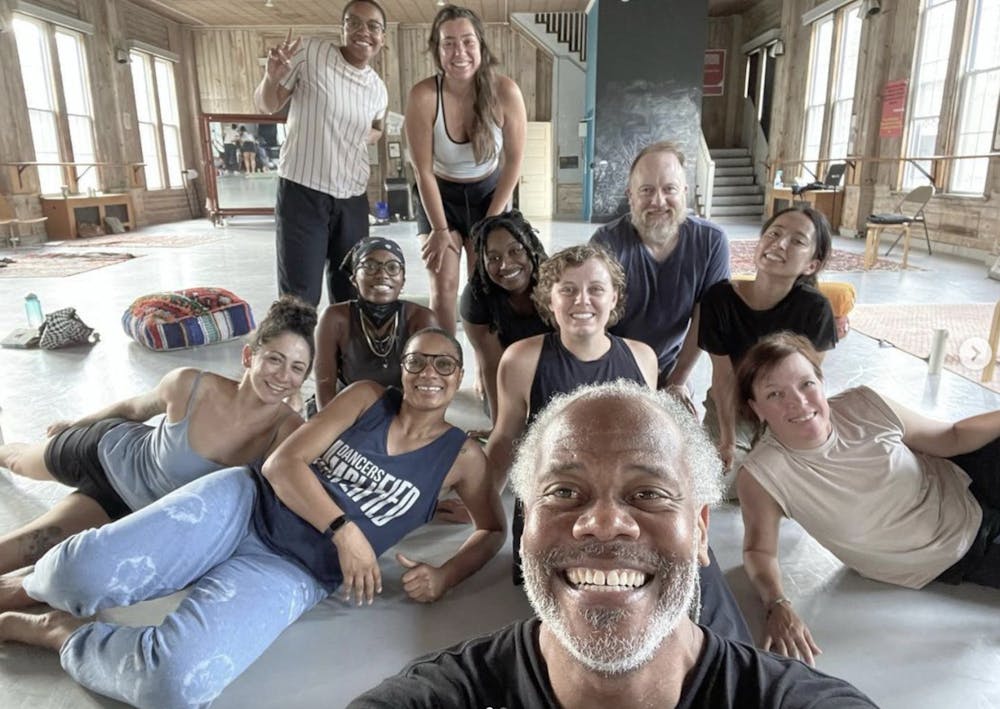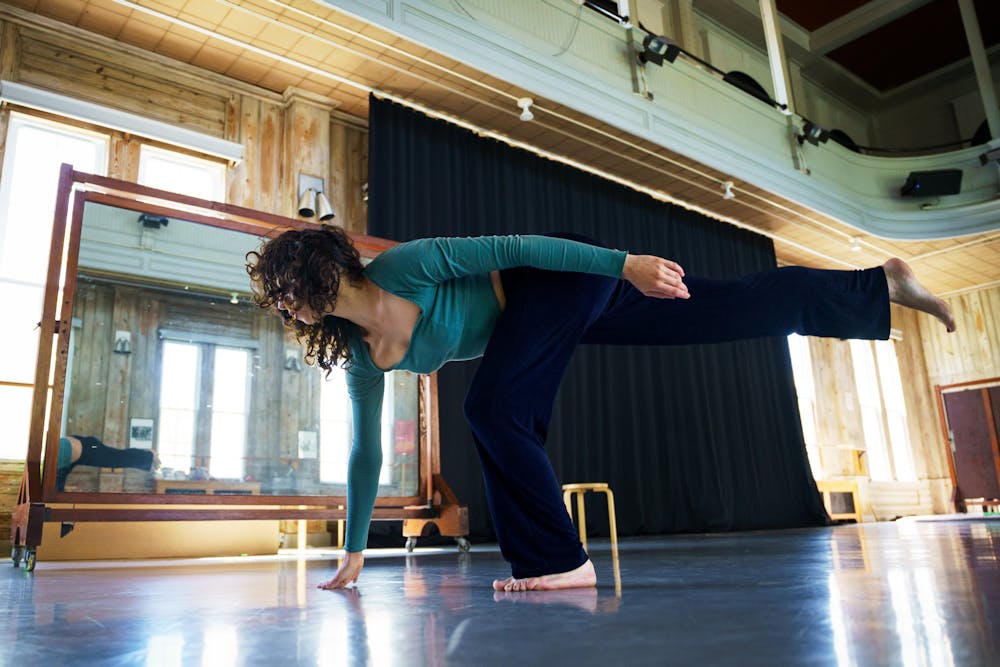Those fortunate enough to have known Angela Risi not only remember her for her talent and creativity, but also for her passion towards community building and her ability to make others feel truly themselves.
Risi, a second-year master of fine arts student in the dance program, died on Oct. 2 at age 30 near her home in Durham. Durham police responded to a report of a gunshot wound early that morning and found two women shot. One of the victims was Risi, who was transported to the hospital and later succumbed to her injuries.
Risi is remembered as a “precociously brilliant” artist and dancer, and someone dear to the communities she touched.
On Oct. 5, Anthony Risi, Angela Risi’s brother, created a GoFundMe campaign to cover immediate costs and to fund a celebration of life memorial. The campaign has since raised over $38,000, far exceeding the original goal of $7,500.
“Angela was a gentle and compassionate soul who was a light in the life of anyone who knew her,” Anthony Risi wrote in the GoFundMe post. “She was quirky, eccentric, and bursting with intelligence and talent, but we will never get to know how the rest of her story would have unfolded.”
Risi’s father, Matt Risi, told CBS17 that Duke and Durham was the “perfect fit” for her.
“I’m just really sad, sad for her, that her talent and her life was cut short and she wasn’t able to share her talent, her art,” he said. He added that “people have described her as always lighting up a room, always being so cheerful and encouraging.”
In a tribute, Marissa Arriaga, a student at the Tamarind Institute at the University of New Mexico who was in a relationship with Risi for nine years, described her as “such a kind soul with passion for movement and music” who “changed [her] in so many positive ways.”
“I miss her laugh, her silly jokes and her dancing and twirling around the house. She was such an important part of my family, and the emptiness will be felt for the rest of our lives,” Arriaga wrote.

Risi grew up in San Diego, and spent much of her time at the home of Kim Sturner, a family friend of the Risis. Sturner wrote in a tribute that Risi “was like a second daughter.”
“Angela was very creative and imaginative, and she and our daughter Meredith would spend hours making up stories, all the while laughing and giggling,” she wrote.
Risi went on to study English and psychology at San Diego State University, where she worked at the library as a student assistant. There she met Anna Culbertson, head of special collections and university archives at SDSU’s library, who hired her as a research partner on a San Diego Pride grant after she had graduated.
In a tribute, Culbertson wrote that Risi was “such a breath of fresh air,” describing her as “outgoing, warm and funny.”
“She was so precociously brilliant for an undergraduate. I found myself constantly having to modify my assumptions not only when showing her how to do things but also when talking theory with her,” she wrote. “... I knew she was going places.”
Risi then moved to Chicago and worked at the University of Chicago for five years, including a stint as a department assistant in the school’s department of music, where she had focused on “building community.”
While in the Windy City, Risi became the first student at a new non-profit dance studio, the Chicago Movement Collective. Ethan Kirschbaum, who founded the studio, said that after they had announced a new scholarship program, Risi was “literally the first person in [his] inbox.”
Kirschbaum would go on to mentor Risi for two years before she left to attend Duke, spending “countless days” in the studio with her which he now realizes he took for granted.
“I really had a love for this person and this student and they really had a love for dance and for community and connecting with people,” he said.
Risi played an important role in cultivating the CMC community, especially as its first student. Kirshbaum noted that “there was no one that didn’t like Angela.” To continue her legacy at CMC, Kirschbaum is working on a new scholarship award to commemorate her that would possibly support students leaving the program for a “higher pursuit.”

When Risi arrived at Duke, her natural propensity for community building did not go away, especially in the smaller, tight-knit dance program of only seven faculty members and six graduate students.
In a tribute, Leo Ryan, Graduate School ‘23, wrote that Risi “seemed to be on a mission of community-building” due to her ability to make a lot of friends very quickly, something they labeled “mesmerizing.”
“Angela begged us all to see the value in community,” they wrote. “Specifically, she reminded me personally of the value in queer community and nudged me out of bouts of self-isolation.”
Brooks Emanuel, Graduate School ‘23 and adjunct professor in the Kenan Institute for Ethics, wrote in a tribute that part of the reason the two had connected was that they “were both very extroverted and thrived on connection” and related to a feeling of isolation from people who “had so little time to spend together.”
“She was constantly cultivating community,” he wrote. “... Rather than staying in a grad school bubble, she had friends from all over the Durham community.”
Emanuel described how when they spent time together, he felt “embraced and free” because of how she allowed others to “be more truly [them]selves.”
“She affirmed me personally, and through the way she carried herself in the world — the politics and ethics of her being — she affirmed the humanity of everyone she came across,” he wrote.

Christopher Scully-Thurston, theater operations supervisor of venue and production management, worked closely with Angela to help bring a concept she had for an installation art piece to life.
The main concept for the piece involved improv dance, music, projection and a sculpture Risi made out of fabric and plastic. It sought to communicate the inside of a body, including the heartbeat and nervous system.
“It was a really intense and well thought through and really beautiful piece,” Scully-Thurston said. “... I was able to help her because she had such a strong idea with what she wanted to do. That’s kind of a rare artist, they can visualize the whole thing.”
Last year, Scully-Thurston had spoken with Risi about releasing a soundtrack they had made for Risi’s installation. He sent it out to a label in Mexico City who had agreed to put it on a compilation, but the track was then lost.
The weekend before Risi died, someone at the label told Scully-Thurston that they had found the track and were able to put it on the compilation. As he was doing promotional work for the compilation and sharing his stories of working with Risi on her installation, he found out Risi’s “spirit had been released.”
“It was really intense to realize that those two things were happening at exactly the same time,” he said.
Sarah Wilbur, director of graduate studies in the Department of Dance program's master of fine arts, said she was “completely honored to have known Angel.”
“She was not only a beautiful mover and a beautiful artist, but just the depths of her intellect and intelligence is something that immediately was recognized well beyond the dance community,” she said.
Graduate students in the interdisciplinary dance program are required to be involved with other areas of Duke, which Risi took full advantage of. According to Wilbur, Risi was the only artist and only non-doctoral student that took part in the Black Feminist Theory Summer Institute, and was generally “really conversant in a lot of different communities about dance and the power of movement.”
“She's one of these artists who's not afraid to make all the impossible connections possible, and she was really doing that and networking her way around campus to all different corners of the community through her intellect, her artistry and her presence,” Wilbur said. “She’s a force of nature — she’s a supernova type of artist.”
Get The Chronicle straight to your inbox
Signup for our weekly newsletter. Cancel at any time.

Jazper Lu is a Trinity junior and managing editor of The Chronicle's 119th volume.

